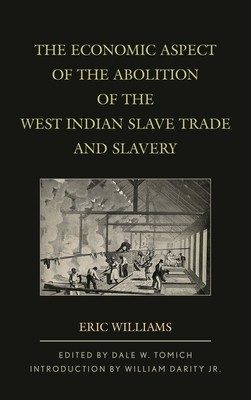
- We will send in 10–14 business days.
- Author: Eric Williams
- Publisher: Rowman & Littlefield Publishers
- ISBN-10: 1442231394
- ISBN-13: 9781442231399
- Format: 15.8 x 23.1 x 2.5 cm, kieti viršeliai
- Language: English
- SAVE -10% with code: EXTRA
The Economic Aspect of the Abolition of the West Indian Slave Trade and Slavery (e-book) (used book) | bookbook.eu
Reviews
Description
In his influential and widely debated Capitalism and Slavery, Eric Williams examined the relation of capitalism and slavery in the British West Indies. Binding an economic view of history with strong moral argument, his study of the role of slavery in financing the Industrial Revolution refuted traditional ideas of economic and moral progress and firmly established the centrality of the African slave trade in European economic development. He also showed that mature industrial capitalism in turn helped destroy the slave system. Establishing the exploitation of commercial capitalism and its link to racial attitudes, Williams employed a historicist vision that has set the tone for an entire field. Williams's profound critique became the foundation for studies of imperialism and economic development and has been widely debated since the book's initial publication in 1944. The Economic Aspect of the Abolition of the West Indian Slave Trade and Slavery now makes available in book form for the first time his dissertation, on which Capitalism and Slavery was based. The significant differences between his two works allow us to rethink questions that were considered resolved and to develop fresh problems and hypotheses. It offers the possibility of a much deeper reconsideration of issues that have lost none of their urgency--indeed, whose importance has increased.
EXTRA 10 % discount with code: EXTRA
The promotion ends in 23d.17:02:43
The discount code is valid when purchasing from 10 €. Discounts do not stack.
- Author: Eric Williams
- Publisher: Rowman & Littlefield Publishers
- ISBN-10: 1442231394
- ISBN-13: 9781442231399
- Format: 15.8 x 23.1 x 2.5 cm, kieti viršeliai
- Language: English English
In his influential and widely debated Capitalism and Slavery, Eric Williams examined the relation of capitalism and slavery in the British West Indies. Binding an economic view of history with strong moral argument, his study of the role of slavery in financing the Industrial Revolution refuted traditional ideas of economic and moral progress and firmly established the centrality of the African slave trade in European economic development. He also showed that mature industrial capitalism in turn helped destroy the slave system. Establishing the exploitation of commercial capitalism and its link to racial attitudes, Williams employed a historicist vision that has set the tone for an entire field. Williams's profound critique became the foundation for studies of imperialism and economic development and has been widely debated since the book's initial publication in 1944. The Economic Aspect of the Abolition of the West Indian Slave Trade and Slavery now makes available in book form for the first time his dissertation, on which Capitalism and Slavery was based. The significant differences between his two works allow us to rethink questions that were considered resolved and to develop fresh problems and hypotheses. It offers the possibility of a much deeper reconsideration of issues that have lost none of their urgency--indeed, whose importance has increased.


Reviews